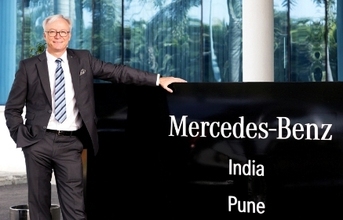
Adding to the manufacturing portfolio
Last year, Mercedes-Benz India added three new products — GLA, CLA and even the Mercedes-Maybach S 500 — to its Chakan manufacturing portfolio. That shows the growing faith that the Company has in this market. Folger also doesn't rule out more additions going ahead. "But that depends on the numbers to make it viable," he adds. True, it is a business case logic that has to apply because it means that Mercedes-Benz will have to train people, add something to the manufacturing capabilities over here and, importantly, it needs to be sustainable. "Any kind of number needs to be a lifecycle number over several years.
"We need to be able to hold that number and that then is the defining factor to do that locally. An exception may be the S-Class Maybach because the numbers are rather small but in that case the viability comes through the overall profit margin. It also comes from the fact that the vehicle by producing locally is so much more affordable and that you see the difference between the S 600 and the S 500 Maybach. Thus, that vehicle became a very interesting proposition. Ever since we have introduced it, it has proven itself by having a much higher demand than anticipated," he shares without hiding the excitement.
While he refuses to provide model specific information but shares that the overall local content in Mercedes Benz India cars is around 60 percent. "We obviously wish to increase that number as we could transfer that into more monetarily accessible cars that give us higher volumes and that basically funds the overall profit making machine as well. Additionally, what is positive in terms of our purpose is that with the ‘Make in India' campaign we expect that there will be more attention to India. At present most of our German suppliers say ‘why go to India'.
Folger believes that it is necessary to get the Company's German suppliers interested in India in the first place. "Secondly, we need to increase our volumes so that it will make sense to these suppliers. Then, instead of delivering to us in Germany, they could come to India and start supplying to us locally. And then maybe, they could also deliver to Germany.
"In fact there are some companies which export hundred percent of their local production - amongst others, also to Mercedes. So we already have such examples. We just need more. Again, this whole issue of numbers is important not because of the short-sighted ‘oh we are number one' but it is important because it gives us a good business case and we can use that business case to convince the headquarters that we get more budget and that we can make more investments and therefore contribute more jobs and investments here, which is the key objective of ‘Make in India'," he explains.
(Continued on the next page)


























